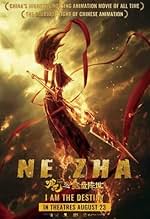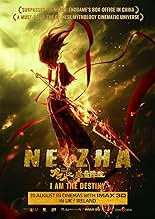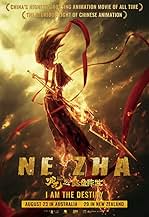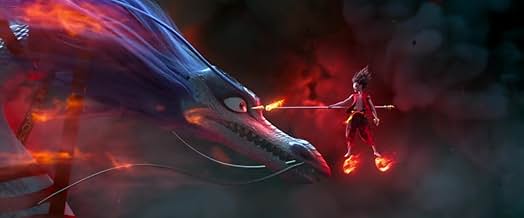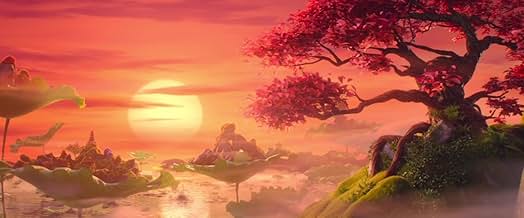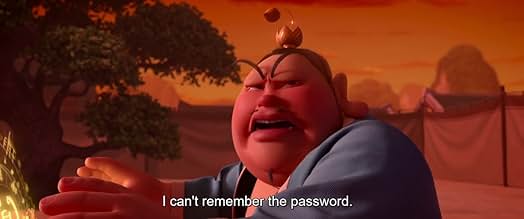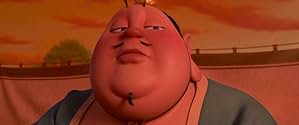Né avec des pouvoirs uniques, un garçon est recruté pour combattre les démons et sauver la communauté qui le craint.Né avec des pouvoirs uniques, un garçon est recruté pour combattre les démons et sauver la communauté qui le craint.Né avec des pouvoirs uniques, un garçon est recruté pour combattre les démons et sauver la communauté qui le craint.
- Prix
- 21 victoires et 24 nominations au total
Yanting Lü
- Boy Nezha
- (voice)
Joseph
- Teenager Nezha
- (voice)
- (as Jiongsensefu)
Jiaming Zhang
- Taiyi Zhenren
- (voice)
Wei Yang
- Shengongbao
- (voice)
Jordan Cole
- Nezha
- (English version)
- (voice)
Kei Gambit
- Boy Nezha
- (English version)
- (voice)
Mike Pollock
- Taiyi Zhenren
- (English version)
- (voice)
Jamieson Price
- Supreme Lord
- (English version)
- (voice)
Griffin Puatu
- Teenager Nezha
- (English version)
- (voice)
Sommaire
Reviewers say 'Ne Zha' is acclaimed for its stunning animation and dynamic action, offering a fresh take on Chinese mythology with humor and emotional depth. However, some find the story predictable and trope-reliant, with humor occasionally misaligned. Character development, especially for Ne Zha and his parents, is noted as underdeveloped. Despite these flaws, the film is celebrated for its technical excellence and cultural impact.
Avis en vedette
The Chinese cinema scene has had many gems, but historically these gems could only be found in relatively small budget independent productions. Diamonds in the rough, if you will. The Chinese blockbuster scene has long been... bleak, to say the least. But here we are, and it is in this context that I find the quality of this film to be kind of unbelievably good. The narrative structure, characters, writing, and animation are all astonishingly well done, and I was left particularly impressed by the very original interpretation of a classic folklore tale. The story of Ne Zha has been portrayed numerous times in the history of Chinese storytelling, yet this one did not obviously rehash them, which is a remarkable decision for a Chinese production. This film is a towering achievement for Chinese cinema.
The following is not necessarily a review of the film, but a recount of my own viewing experience of this film.
After months of rolling my eyes at the social media buzz about this supposedly "great Chinese animation", I finally found the one Regal theater in town that actually shows this movie. And I'm glad I did.
Initially, I was turned off by this movie's trailer, since it had all the worst stereotypes of a Chinese-made film, with all the cheesy expositions, cringey dialogues, and awkward voice acting. I was so sure that "Nezha" was just another piece of garbage coming out of the money-grabbing film industry that had become so shamelessly greedy in recent years. But my low expectations were pleasantly subverted.
After some struggling of finding a parking spot, I found myself in a relatively small-sized IMAX theater packed with young Chinese people, and a handful of white Americans, and one nice black lady who very much stood out in this crowd. And I'm almost certain that all of us enjoyed the two hours of fun and entertainment this film offered us, albeit on different levels.
Almost immediately after the movie started playing, I found myself already irritated by the unnecessarily long opening credits of all the production companies associated with "Nezha". This is one of the many shady industry practices in China, where all the entities involved in the film's production process shamelessly tried to promote their brands, regardless of how much actual contribution they've made. But shortly after the actual film began to show on the screen, I was easily won over by the opening scene where the famous Daoist immortal "Taiyi Zhenren" was revealed to be an obese and seemingly incompetent idiot. It was a subversion of the genre trope. When it comes to the genre of Chinese mythology films, Daoist immortals were almost always portrayed as wise old men whose wisdom and authority are not to be questioned. And here in "Nezha", one of the most powerful and respected Daoist deities was portrayed as a buffoon who actually had real human personality.
And at the same time, I was surprised to find myself actually enjoying the jokes and humors of the film, which I think is very rare in Chinese films. Even though I haven't watched any Chinese film for many years, I'm aware of the awfulness and cringiness of the typical attempts at comedy by trying to crack an awkward joke between scenes in Chinese films. But here in "Nezha", I enjoyed most of the comedy in it, even though I can see how goofy it is. Goofiness in film can be a good thing if it is done in the right tone.
There are more turns and twists than I expected throughout the film, and I enjoyed the whole ride. However, I have to point out, there are one or two very brief moments in the film, which I didn't appreciate as much. I know the filmmakers were being serious in those brief moments, trying to evoke a certain emotion from audience. But it didn't work on me because of the voice acting in those scenes which took me right out of the film. Don't get me wrong, the voice acting was great in "Nezha", much better than most films. But in certain brief moments, it just didn't work for me.
Now comes another possible issue of "Nezha", which might be an impediment to the general audience's enjoyment of this film. That is the English subtitles. I have to acknowledge that I myself could not do a better job than they did, at translating the Ancient Chinese mythological concepts into modern-day English while trying to make sense to an audience unfamiliar with Chinese culture at large. But I'd like to argue perhaps transliteration might be a better approach than imprecise translation. Also I have to point out, as with almost all foreign language films, the humors and multi-layered emotions of most dialogues in "Nezha" were inevitably lost in translation.
Overall, "Nezha" was one of the best Chinese entertainment I've experienced in recent years, even though I haven't really watched that many real Chinese films. I'm glad that "Nezha" got a huge box office success in China which it so very much deserves. I'm not so sure "Nezha" would be a hit elsewhere. It might get popular to a certain degree on some streaming platforms. But I doubt it will get mainstream popularity in US, since most American media's portrayal of everything remotely related to China has been so negative lately ever since the Trade War.
Anyway, for me, I thoroughly enjoyed "Nezha". But I don't know the experience would be the same for everyone, since you have to have a certain willingness to put up with imprecise translation while at the same time trying to be culturally open-minded.
P.S. Sorry about my rambling in this long-ass review. But I can't believe I actually enjoyed a Chinese animation film so I have to take the time to write my genuine feelings about it.
(Additional comments: CHINA was the nation that had once gave the world the absolutely worst garbage film series ever produced by mankind. I'm talking about, of course, the infamous "Tiny Times" series by the famed gay novelist Guo Jingming. Ever since my great suffering by Guo Jingming's garbage films, I had never ever given any Chinese-made films any sort of serious interest until the year 2019. At the beginning of this year, there was the surprise box office success, the "Wandering Earth", which I also enjoyed. And now I'm thoroughly won over by "Nezha". I think it's been a good year for the Chinese film-making and we shall see if it will last.)
After months of rolling my eyes at the social media buzz about this supposedly "great Chinese animation", I finally found the one Regal theater in town that actually shows this movie. And I'm glad I did.
Initially, I was turned off by this movie's trailer, since it had all the worst stereotypes of a Chinese-made film, with all the cheesy expositions, cringey dialogues, and awkward voice acting. I was so sure that "Nezha" was just another piece of garbage coming out of the money-grabbing film industry that had become so shamelessly greedy in recent years. But my low expectations were pleasantly subverted.
After some struggling of finding a parking spot, I found myself in a relatively small-sized IMAX theater packed with young Chinese people, and a handful of white Americans, and one nice black lady who very much stood out in this crowd. And I'm almost certain that all of us enjoyed the two hours of fun and entertainment this film offered us, albeit on different levels.
Almost immediately after the movie started playing, I found myself already irritated by the unnecessarily long opening credits of all the production companies associated with "Nezha". This is one of the many shady industry practices in China, where all the entities involved in the film's production process shamelessly tried to promote their brands, regardless of how much actual contribution they've made. But shortly after the actual film began to show on the screen, I was easily won over by the opening scene where the famous Daoist immortal "Taiyi Zhenren" was revealed to be an obese and seemingly incompetent idiot. It was a subversion of the genre trope. When it comes to the genre of Chinese mythology films, Daoist immortals were almost always portrayed as wise old men whose wisdom and authority are not to be questioned. And here in "Nezha", one of the most powerful and respected Daoist deities was portrayed as a buffoon who actually had real human personality.
And at the same time, I was surprised to find myself actually enjoying the jokes and humors of the film, which I think is very rare in Chinese films. Even though I haven't watched any Chinese film for many years, I'm aware of the awfulness and cringiness of the typical attempts at comedy by trying to crack an awkward joke between scenes in Chinese films. But here in "Nezha", I enjoyed most of the comedy in it, even though I can see how goofy it is. Goofiness in film can be a good thing if it is done in the right tone.
There are more turns and twists than I expected throughout the film, and I enjoyed the whole ride. However, I have to point out, there are one or two very brief moments in the film, which I didn't appreciate as much. I know the filmmakers were being serious in those brief moments, trying to evoke a certain emotion from audience. But it didn't work on me because of the voice acting in those scenes which took me right out of the film. Don't get me wrong, the voice acting was great in "Nezha", much better than most films. But in certain brief moments, it just didn't work for me.
Now comes another possible issue of "Nezha", which might be an impediment to the general audience's enjoyment of this film. That is the English subtitles. I have to acknowledge that I myself could not do a better job than they did, at translating the Ancient Chinese mythological concepts into modern-day English while trying to make sense to an audience unfamiliar with Chinese culture at large. But I'd like to argue perhaps transliteration might be a better approach than imprecise translation. Also I have to point out, as with almost all foreign language films, the humors and multi-layered emotions of most dialogues in "Nezha" were inevitably lost in translation.
Overall, "Nezha" was one of the best Chinese entertainment I've experienced in recent years, even though I haven't really watched that many real Chinese films. I'm glad that "Nezha" got a huge box office success in China which it so very much deserves. I'm not so sure "Nezha" would be a hit elsewhere. It might get popular to a certain degree on some streaming platforms. But I doubt it will get mainstream popularity in US, since most American media's portrayal of everything remotely related to China has been so negative lately ever since the Trade War.
Anyway, for me, I thoroughly enjoyed "Nezha". But I don't know the experience would be the same for everyone, since you have to have a certain willingness to put up with imprecise translation while at the same time trying to be culturally open-minded.
P.S. Sorry about my rambling in this long-ass review. But I can't believe I actually enjoyed a Chinese animation film so I have to take the time to write my genuine feelings about it.
(Additional comments: CHINA was the nation that had once gave the world the absolutely worst garbage film series ever produced by mankind. I'm talking about, of course, the infamous "Tiny Times" series by the famed gay novelist Guo Jingming. Ever since my great suffering by Guo Jingming's garbage films, I had never ever given any Chinese-made films any sort of serious interest until the year 2019. At the beginning of this year, there was the surprise box office success, the "Wandering Earth", which I also enjoyed. And now I'm thoroughly won over by "Nezha". I think it's been a good year for the Chinese film-making and we shall see if it will last.)
Gorgeous and expressive characters, lush animation, dynamic action sequences, hilarious humour (some may argue it's juvenile but I enjoy Asian humour) and many touching scenes... I'll confess that at one point I was brought to tears. The highlight of the film for me was the pinball sequence. This is probably one of the best films I've ever seen.
I've read reviews on here that criticize the English subtitles. On Netflix they seem fine.
I've read reviews on here that criticize the English subtitles. On Netflix they seem fine.
I did not originally want to watch this film as I do not like the story it is based on but I am glad I did.
I am a huge fan of myths and legends of different countries and cultures and I liked the old Chinese animations. 4 years ago, they made a Monkey King animation which I loved and finding out that that team helped on the Nezha movie was one of the reasons why I chose to watch it.
The core concept is about fighting fate and against how others see you. Another point I loved about it is as it is a Chinese movie it is told from a Chinese perspective and from Chinese culture. This is great way for people to learn more Chinese people and culture. The down side is it is different to movies that we are used to and a lot will not be understood if we are not Chinese or know much about Chinese mythology. Also some of the jokes reference Stephen Chow's work.
The English title "I am the destiny" makes sense to Chinese viewers, it is meant to be artistic with deep meanings (I spent a day discussing the title with my wife who is Chinese, she was explaining why she understood this title while it would not have been her first choice). Think of it as "I make my own fate" or if they just chose "Nezha: Fate"
The animation is amazing, the difference between the characters (humans, animals, clouds) and the scenery is marvellous. I wished to look at more of the buildings but that's just me being weird.
The music is great. Very exciting and also a lot using traditional Chinese instruments (one part is a tribute to the Terminator movies with traditional Chinese instruments) also the credits music is a great song they made for the moive with a lot of great lyrics (in Chinese)
The action scenes are beautifully made and flow very well. Also the pacing of the movie is perfect, at no point did I feel they dragged a joke or a scene on for too long.
The story is a retelling so some people may be annoyed that it deviating from the original but Disney does it all the time so leave them alone. The story is interesting and the changes makes it more relatable.
There are some bugs with the animation but they almost didn't finish in time for the summer holidays so I'm willing to overlook that.
What's more is the director's backstory. He studied medicine in University. His animation background, all self taught. Made a 3d animation by himself and won a lot of awards. The company he works for now collected a lot of animation companies together to make this movie. They risked a lot but this movie is the director's dream which he had been thinking about for years.
This can be seen in his attention to details. One of the charecters has a different accent because of where this character is from. And the director spent a lot of time to find the perfect voice actors for his characters (which I find to be a major failing of the Chinese animation industry in general, some beautiful animations ruined by frustratingly annoying voice actors)
Background information you should know. The old guy is the most powerful in heaven. In China, a master takes disciples for training. He is like a parent, teacher and master at the same time. Choosing a master or a disciple is not entered into lightly. At that time, monster attacks are common and many people have lost family to them. Might need to find a Chinese friend to help explain other points you may find confusing
I've seen it 7 times and I advice you to watch it on IMAX, looks better.
I hope they get a good subtitles team, a lot of jokes will be hard to translate. I also hope that they don't dub it. The dubbed version of "Hero is Back" the Monkey King animation was terrible and ruined it Also hope that they will release it in China with the English subtitles so that I have an excuse to watch it again
I am a huge fan of myths and legends of different countries and cultures and I liked the old Chinese animations. 4 years ago, they made a Monkey King animation which I loved and finding out that that team helped on the Nezha movie was one of the reasons why I chose to watch it.
The core concept is about fighting fate and against how others see you. Another point I loved about it is as it is a Chinese movie it is told from a Chinese perspective and from Chinese culture. This is great way for people to learn more Chinese people and culture. The down side is it is different to movies that we are used to and a lot will not be understood if we are not Chinese or know much about Chinese mythology. Also some of the jokes reference Stephen Chow's work.
The English title "I am the destiny" makes sense to Chinese viewers, it is meant to be artistic with deep meanings (I spent a day discussing the title with my wife who is Chinese, she was explaining why she understood this title while it would not have been her first choice). Think of it as "I make my own fate" or if they just chose "Nezha: Fate"
The animation is amazing, the difference between the characters (humans, animals, clouds) and the scenery is marvellous. I wished to look at more of the buildings but that's just me being weird.
The music is great. Very exciting and also a lot using traditional Chinese instruments (one part is a tribute to the Terminator movies with traditional Chinese instruments) also the credits music is a great song they made for the moive with a lot of great lyrics (in Chinese)
The action scenes are beautifully made and flow very well. Also the pacing of the movie is perfect, at no point did I feel they dragged a joke or a scene on for too long.
The story is a retelling so some people may be annoyed that it deviating from the original but Disney does it all the time so leave them alone. The story is interesting and the changes makes it more relatable.
There are some bugs with the animation but they almost didn't finish in time for the summer holidays so I'm willing to overlook that.
What's more is the director's backstory. He studied medicine in University. His animation background, all self taught. Made a 3d animation by himself and won a lot of awards. The company he works for now collected a lot of animation companies together to make this movie. They risked a lot but this movie is the director's dream which he had been thinking about for years.
This can be seen in his attention to details. One of the charecters has a different accent because of where this character is from. And the director spent a lot of time to find the perfect voice actors for his characters (which I find to be a major failing of the Chinese animation industry in general, some beautiful animations ruined by frustratingly annoying voice actors)
Background information you should know. The old guy is the most powerful in heaven. In China, a master takes disciples for training. He is like a parent, teacher and master at the same time. Choosing a master or a disciple is not entered into lightly. At that time, monster attacks are common and many people have lost family to them. Might need to find a Chinese friend to help explain other points you may find confusing
I've seen it 7 times and I advice you to watch it on IMAX, looks better.
I hope they get a good subtitles team, a lot of jokes will be hard to translate. I also hope that they don't dub it. The dubbed version of "Hero is Back" the Monkey King animation was terrible and ruined it Also hope that they will release it in China with the English subtitles so that I have an excuse to watch it again
The Nezha animated movie has several standout aspects, with its top-notch animation being the biggest plus. However, the pacing of the movie is somewhat slow. On the other hand, the climax is exceptionally well-done, with a thrilling transition from the pre-climax. The music is average and lacks impact. Nevertheless, there are a few memorable dialogues in the climax that leave a lasting impression.
PLOT :: The Primus extracts a Mixed Yuan Bead into a Spirit Seed and a Demon Pill. The Spirit Seed can be reincarnated as a human to help King Zhou establish a new dynasty, whereas the Demon Pill will create a devil threatening humanity. Ne Zha is the one who is destined to be the hero, but instead he becomes a devil incarnate, because the Spirit Seed and a Demon Pill are switched.
PLOT :: The Primus extracts a Mixed Yuan Bead into a Spirit Seed and a Demon Pill. The Spirit Seed can be reincarnated as a human to help King Zhou establish a new dynasty, whereas the Demon Pill will create a devil threatening humanity. Ne Zha is the one who is destined to be the hero, but instead he becomes a devil incarnate, because the Spirit Seed and a Demon Pill are switched.
Le saviez-vous
- AnecdotesThe story can be recognized as a rewritten tale based on the 16th-century Chinese novel "Investiture of the Gods" (Fengshen yanyi). This novel tells the stories of Chinese gods from thousands of years before. The novel itself is based on Chinese folk legends.
- GaffesA containment spell had to be invoked on Ne Zha (twice), resulting on him wearing a necklace. After he uttered a chant to reverse the spell, he changed the necklace to a bracelet for self-control. Yet, he is seen later wearing a necklace without anyone (or himself) having put the spell on him.
- Générique farfeluMid credits scene with the dragon king.
- ConnexionsFollowed by Nezha: Mo tong nao hai (2025)
Meilleurs choix
Connectez-vous pour évaluer et surveiller les recommandations personnalisées
- How long is Ne Zha?Propulsé par Alexa
Détails
- Date de sortie
- Pays d’origine
- Sites officiels
- Langues
- Aussi connu sous le nom de
- Nezha
- sociétés de production
- Consultez plus de crédits d'entreprise sur IMDbPro
Box-office
- Brut – États-Unis et Canada
- 3 695 533 $ US
- Fin de semaine d'ouverture – États-Unis et Canada
- 1 015 755 $ US
- 1 sept. 2019
- Brut – à l'échelle mondiale
- 726 225 471 $ US
- Durée1 heure 50 minutes
- Couleur
- Mixage
- Rapport de forme
- 2.39 : 1
Contribuer à cette page
Suggérer une modification ou ajouter du contenu manquant




